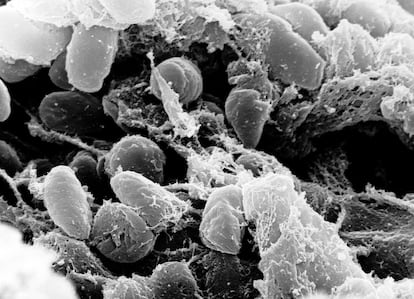Bubonic plague case confirmed in Oregon: What you need to know
A case of the disease that killed millions in medieval times was registered in the U.S. However, experts say there’s no reason for concern

Health officials in Oregon confirmed a case of human bubonic plague. They say a pet owner from Deschutes County — an area under 200 miles southeast of Portland, the state’s largest city — caught the disease from their cat, which marks the first human case in the state in over eight years, according to a news release by Deschutes County Health Services. The plague is best known as the cause for the Black Death in medieval Europe, the worst pandemic ever in history that killed between 25 to 50 million people. However, experts say there should be no concern for people. Here’s what you need to know about it.
What is the bubonic plague?
The World Health Organization says that the bubonic plague is one of three types of plague caused by the bacterium Yersinia pestis. It is considered the cause of the Black Death that killed millions in Asia, Europe and Africa in the 14th century. Experts say that it’s also the cause of two other pandemics in human history: the Plague of Justinian in the 6th century CE and another epidemic which affected China, Mongolia and India in 1855.
The current case
According to a news release, Deschutes County Health Services confirmed a case of human plague in a local resident who was “likely infected by their symptomatic pet cat.” In Central Oregon, the most common animals to carry the disease are squirrels and chipmunks, however, mice and other rodents can also carry the plague.
How did the owner get infected?
The human bubonic plague can spread to humans or animals “through a bite from an infected flea or by contact with an animal sick with the disease,” according to Oregon Health Authority, being that the reason the owner got infected.
Is it dangerous?
If not diagnosed early, the disease can progress to septicemic plague, which is a bloodstream infection, and/or pneumonic plague, which is a lung infection. Both types of infection are more severe and harder to treat. The individual’s case was identified and treated in earlier stages, which reduces the risk of spreading. “All close contacts of the resident and their pet have been contacted and provided medication to prevent illness,” said Dr. Richard Fawcett, Deschutes County Health Officer.
What are the symptoms and treatment of human bubonic plague?
According to the Centers for Disease Control and Prevention, plague symptoms depend on how the patient was exposed to the bacteria. The incubation period of the diseases range from two to eight days. The WHO states that antibiotics and supportive therapy are effective against plague when diagnosed in time. Enterobacteria can also cure the disease if delivered early.
If the patient got the disease from an infected flea, the most common symptoms that they could develop are fever, headache, chills, weakness, and “one or more swollen, painful lymph nodes,” called buboes (being the reason why the disease is named bubonic plague).
Are there more cases?
According to Deschutes County, “no additional cases of plague have emerged during the communicable disease investigation.” The case was the first reported in Oregon since 2015.
How can we avoid the spread of the plague?
The Oregon Health Authority recommends avoiding contact with rodents and their fleas to prevent the spread of diseases like plague. It advises against touching sick, injured, or dead rodents and keeping pets away from them, using flea control products on pets, and discouraging cats from hunting rodents. Residents are urged to keep rodents out of homes and remove attractants. Additionally, it warns against camping near animal burrows or areas with dead rodents, refraining from feeding wild rodents, and taking precautions like wearing long pants and applying insect repellent to reduce flea exposure.
According to the Virginia Department of Health, plague is rare in the U.S. with an average of seven cases reported each year, most commonly in rural and semi-rural areas in the west and southwest. Worldwide, between 1,000 and 2,000 cases are reported each year to the WHO.
Sign up for our weekly newsletter to get more English-language news coverage from EL PAÍS USA Edition
Tu suscripción se está usando en otro dispositivo
¿Quieres añadir otro usuario a tu suscripción?
Si continúas leyendo en este dispositivo, no se podrá leer en el otro.
FlechaTu suscripción se está usando en otro dispositivo y solo puedes acceder a EL PAÍS desde un dispositivo a la vez.
Si quieres compartir tu cuenta, cambia tu suscripción a la modalidad Premium, así podrás añadir otro usuario. Cada uno accederá con su propia cuenta de email, lo que os permitirá personalizar vuestra experiencia en EL PAÍS.
¿Tienes una suscripción de empresa? Accede aquí para contratar más cuentas.
En el caso de no saber quién está usando tu cuenta, te recomendamos cambiar tu contraseña aquí.
Si decides continuar compartiendo tu cuenta, este mensaje se mostrará en tu dispositivo y en el de la otra persona que está usando tu cuenta de forma indefinida, afectando a tu experiencia de lectura. Puedes consultar aquí los términos y condiciones de la suscripción digital.









































